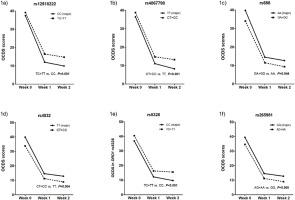DRD1 gene is associated with craving changes during withdrawal among patients with alcohol use disorder
IF 3.2
2区 医学
Q1 PSYCHIATRY
引用次数: 0
Abstract
Background
Alcohol use disorder (AUD) is a chronic relapsing condition in which craving is closely linked to relapse. Previous research has shown that the single nucleotide polymorphisms (SNPs) of the dopamine receptor D1 (DRD1) gene are not associated with craving severity when assessing cross-sectionally. Since craving severity may change after withdrawal, this study tracked craving dynamics over a two-week withdrawal period and examined the relationships with DRD1 SNPs.
Methods
We recruited 221 Taiwanese Han patients with severe AUD diagnosed based on DSM-5-TR and undergoing withdrawal treatment and 117 healthy controls. Alcohol craving was assessed at baseline and after one and two weeks of withdrawal using the Obsessive-Compulsive Drinking Scale (OCDS). DRD1 SNPs were imputed from the genome-wide database, including rs12518222, rs4867798, rs686, rs4532, rs5326, rs265981. Single SNP and haplotype-based analyses were used to evaluate the associations between DRD1 SNPs and craving.
Results
DRD1 SNPs of rs12518222 (3′-UTR) and rs5326 (5′-UTR) of genotype and allele types were significantly associated with AUD (P = 0.008 and < 0.001, respectively). Carriers of the minor alleles at 3′-UTR of rs12518222 (T), rs4867798 (C), and rs5326 (A) and major alleles at 5′-UTR of rs686 (A), rs4532 (T), and rs265981 (G) were associated with higher post -withdrawal craving compared to the counterparts. The haplotype TCATTG, comprising the corresponding allele associated with higher craving was linked to more severe craving severity.
Conclusion
DRD1 gene influences post-withdrawal changes in cravings in AUD patients. These findings may guide personalized treatment strategies aimed at improving craving management and reducing relapse risk.

DRD1基因与酒精使用障碍患者戒断期间的渴望变化有关
背景:酒精使用障碍(AUD)是一种慢性复发性疾病,其渴望与复发密切相关。先前的研究表明,在横断面评估时,多巴胺受体D1 (DRD1)基因的单核苷酸多态性(snp)与渴望程度无关。由于戒断后渴望的严重程度可能会发生变化,本研究追踪了两周戒断期的渴望动态,并检查了与DRD1 snp的关系。方法采用DSM-5-TR诊断的台湾汉族重症AUD患者221例,接受戒断治疗117例。在基线和戒断一周和两周后,使用强迫性饮酒量表(OCDS)评估酒精渴望程度。从全基因组数据库中获取DRD1 snp,包括rs12518222、rs4867798、rs686、rs4532、rss5326、rs265981。使用单SNP和基于单倍型的分析来评估DRD1 SNP与渴望之间的关系。结果基因型和等位基因型rs12518222(3′-UTR)和rss5326(5′-UTR)的drd1 snp与AUD有显著相关性(P = 0.008和<; 0.001)。携带rs12518222 (T)、rs4867798 (C)和rss5326 (A)的3′-UTR小等位基因和携带rs686 (A)、rs4532 (T)和rs265981 (G)的5′-UTR大等位基因的小鼠,戒断后渴望程度高于携带rs12518222 (T)、rs4867798 (C)和rss5326 (A)的小鼠。单倍型TCATTG,包含与高渴望相关的相应等位基因,与更严重的渴望程度有关。结论drd1基因影响AUD患者戒断后的渴望变化。这些发现可以指导个性化的治疗策略,旨在改善渴望管理和降低复发风险。
本文章由计算机程序翻译,如有差异,请以英文原文为准。
求助全文
约1分钟内获得全文
求助全文
来源期刊

Journal of psychiatric research
医学-精神病学
CiteScore
7.30
自引率
2.10%
发文量
622
审稿时长
130 days
期刊介绍:
Founded in 1961 to report on the latest work in psychiatry and cognate disciplines, the Journal of Psychiatric Research is dedicated to innovative and timely studies of four important areas of research:
(1) clinical studies of all disciplines relating to psychiatric illness, as well as normal human behaviour, including biochemical, physiological, genetic, environmental, social, psychological and epidemiological factors;
(2) basic studies pertaining to psychiatry in such fields as neuropsychopharmacology, neuroendocrinology, electrophysiology, genetics, experimental psychology and epidemiology;
(3) the growing application of clinical laboratory techniques in psychiatry, including imagery and spectroscopy of the brain, molecular biology and computer sciences;
 求助内容:
求助内容: 应助结果提醒方式:
应助结果提醒方式:


